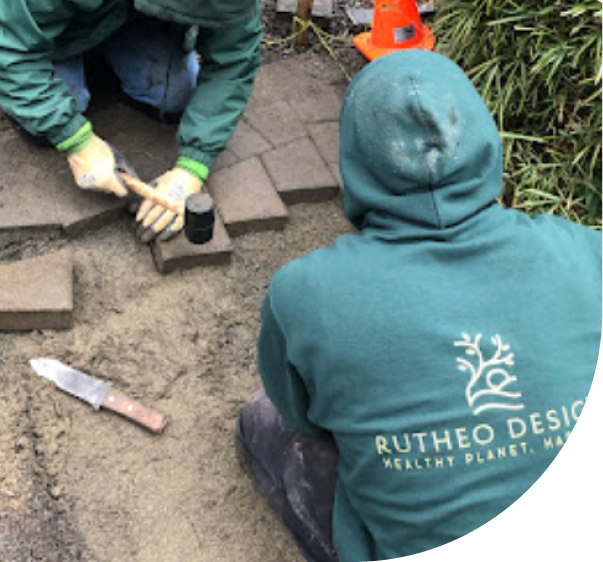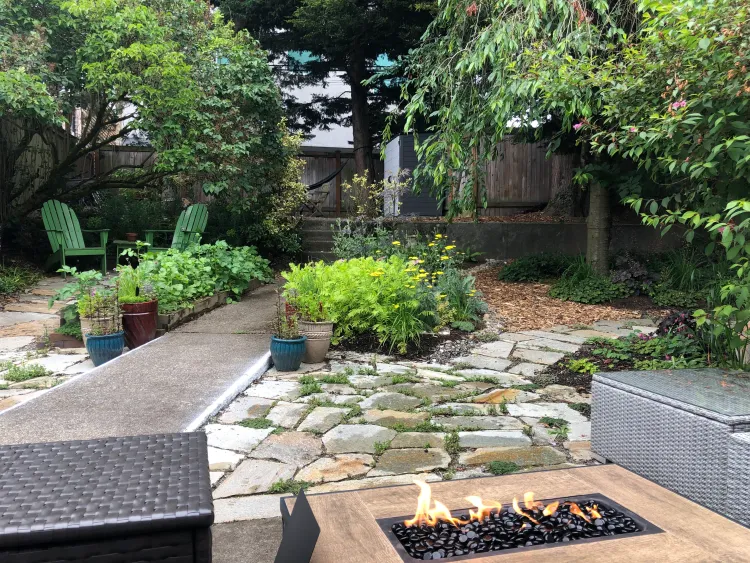
At Rutheo Designs, we prioritize using sustainable materials and techniques that align with Seattle’s unique environmental needs and values. Our approach begins with selecting eco-friendly materials, such as reclaimed wood, permeable pavers, and recycled composites, which reduce waste and carbon emissions while maintaining durability and aesthetic appeal. We source many of our materials locally, supporting the Seattle area’s economy and minimizing the environmental impact of transportation. These materials, combined with thoughtful design, help create landscapes that manage stormwater effectively, prevent soil erosion, and contribute to healthier ecosystems in the Pacific Northwest.
Incorporating advanced techniques is equally vital to achieving sustainable landscapes. We integrate solutions like smart irrigation systems and rainwater harvesting to conserve water, while drip irrigation and rain gardens reduce runoff and support local waterways. To ensure long-term soil health, we conduct thorough soil testing and use organic amendments, promoting robust plant growth without relying on harmful chemicals. By blending native and drought-tolerant plants into our designs, we enhance biodiversity while reducing maintenance and water usage. Our goal is to create outdoor spaces that are not only beautiful but also functional and environmentally responsible, reflecting Seattle homeowners’ commitment to sustainability.
Using locally sourced materials is a cornerstone of sustainable landscaping. Materials produced within the Seattle area reduce the carbon footprint associated with long-distance transportation, minimizing greenhouse gas emissions. Local sourcing also ensures materials are well-suited to the Pacific Northwest’s environmental conditions.
Seattle and its surrounding regions are rich in natural resources and reclaimed materials. Basalt, for example, is a durable and visually striking stone that is often available locally. Reclaimed wood, salvaged from old buildings or driftwood collected from coastal areas, offers a rustic aesthetic while contributing to waste reduction.
Sourcing from local suppliers strengthens the Seattle economy and fosters sustainability-focused businesses. By working with these vendors, we contribute to a cycle of eco-conscious practices while ensuring materials are high-quality and sustainably harvested.
Recycled and reclaimed materials are excellent choices for environmentally friendly hardscapes. Reclaimed bricks, concrete, and pavers are versatile options for pathways, patios, and retaining walls, blending functionality with sustainability.
Decking and fencing materials made from recycled plastics offer a long-lasting, low-maintenance alternative to traditional wood. These products divert waste from landfills while maintaining the aesthetic appeal of natural wood.
Reclaimed wood can be used creatively in garden beds, fencing, or outdoor furniture. This not only reduces waste but also adds character to the landscaping design with its unique textures and history.
Permeable paving is a sustainable solution that allows water to pass through surfaces, replenishing the groundwater table. Gravel paths, pavers with wide joints, and specially designed permeable concrete are all effective options for Seattle landscapes.
Seattle’s frequent rainfall can lead to excessive stormwater runoff, which contributes to erosion and water pollution. Permeable surfaces help mitigate these issues by allowing water to filter naturally into the soil.
Incorporating permeable materials aligns with local regulations designed to manage stormwater. These surfaces support sustainable drainage systems, reducing the strain on municipal infrastructure while protecting nearby water bodies.
Mulching is a practical and sustainable way to improve soil health and conserve moisture. Organic options like wood chips, bark, or compost enhance soil structure and fertility while suppressing weed growth.
By reducing water evaporation and maintaining consistent soil temperatures, mulch supports plant health even during dry periods. It also prevents erosion during heavy rains, a common challenge in Seattle.
Locally sourced mulch options, such as yard waste compost or recycled wood chips, are both sustainable and cost-effective. Using these materials minimizes environmental impact while supporting local recycling programs.
Healthy soil is the foundation of a sustainable landscape. Conducting soil tests helps us determine pH levels and nutrient needs, ensuring plants thrive without excessive fertilizers. Amending soil with compost or organic fertilizers improves its fertility and supports long-term plant health.
Water efficiency is crucial in landscaping, especially in the Pacific Northwest. Installing drip irrigation systems delivers water directly to plant roots, reducing waste. Rain barrels provide a simple way to harvest Seattle’s abundant rainfall for irrigation, while rain gardens effectively manage excess runoff.
Preserving the natural integrity of the site is an essential aspect of eco-friendly landscaping. Using lightweight equipment and manual techniques helps reduce soil compaction and erosion. Additionally, protecting existing vegetation and habitats ensures the local ecosystem remains undisturbed.
Native plants, such as salal and Oregon grape, are perfectly adapted to Seattle’s climate. These species require less water and maintenance while providing essential habitat for pollinators and other wildlife.
Mixing drought-tolerant plants with native species creates a landscape that’s both attractive and low-maintenance. Resilient plants that resist pests and diseases also reduce the need for chemical treatments, promoting a healthier environment.
Edible plants, like blueberries, kale, and herbs, combine sustainability with practicality. They thrive in Seattle’s climate and provide fresh, homegrown produce, making them a popular choice for eco-conscious homeowners.

At Rutheo Designs, we are dedicated to transforming your outdoor spaces into beautiful, sustainable landscapes that reflect your vision and the unique character of the Seattle area. We offer services in native plant landscaping, water-efficient irrigation, custom landscape design, and hardscaping solutions tailored to your goals and the local environment. Every project is unique, and we take the time to listen to your needs and offer personalized solutions that align with both your aspirations and Seattle’s natural surroundings.
We invite you to reach out to us to start the conversation about your landscaping needs. You can contact us by email at connect@rutheodesigns.com or give us a call at (360) 844-2989. Whether you have specific questions or are ready to schedule a consultation, we’re eager to help you bring your outdoor vision to life with the care and expertise that Rutheo Designs is known for.